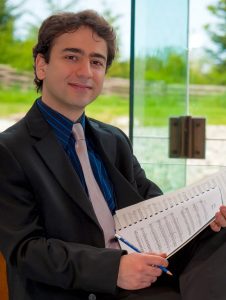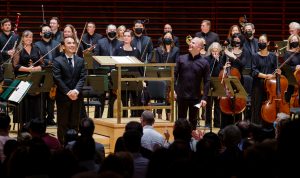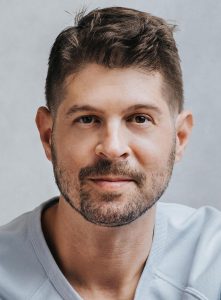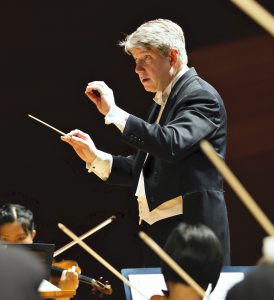IF THESE TREES COULD TALK: Symphony’s paean to nature includes valiant new compositional voice
Imagine a world in which classical music is forbidden fruit, and learning to play Beethoven or Chopin or Mozart is a subversive act. That’s the environment in which Composer-Pianist Iman Habibi was raised: post-Revolutionary Tehran, where instrumental music was frowned upon, or even banned. And although his parents encouraged Iman’s skills on the family’s 40-key Casio keyboard (they eventually found him a full-sized piano and an excellent teacher), he still had to keep his love of music a secret, especially from the teachers at his Islamic school.

“I had to sign a paper,” said the Iranian-Canadian composer recently from his home in Toronto. “I basically lied to them and told them I had quit playing piano, and that’s how I managed to stay in school.” By high school, he was more immersed in music than ever, despite his teachers’ warnings that Iran offered no career in music.
“It was my teenage rebellion, partially,” Iman said. “Because it was music that I felt nobody else understood… music that nobody else listened to. So it became ‘my’ music. I connected with it, I loved it, to me it was fascinating. But nobody else understood what I was getting out of it. There’s an appeal to that for a teenager.” Eventually, he would discover there were others around the world who shared his passion. “But for now, I was in my own bubble.”
His family emigrated to Canada when Iman was 17: There he enrolled at the University of British Columbia and immediately began to flourish as pianist and composer. But he still remembers his childhood fascination with the keyboard.
“I have tapes of myself improvising. … It went on for hours and hours, and it was just so entertaining to me.” (Pianism still forms a crucial part of his identity as a musician: In 2010 Iman and his wife, Pianist Deborah Grimmett, formed a professional piano due they call Piano Pinnacle.)

When he began playing from scores, he still had only the notes on the page to go from, and he found himself creating his own fanciful recreations of the classics. “I had my own versions of these pieces,” he said. “I didn’t follow the dynamic markings, I didn’t follow the tempo markings. It was a really strange entry into classical music. … It’s not that tapes and recordings weren’t available: It’s just that they weren’t available to me.”
Eventually he did get to listen to the great classical repertoire, but by that time his sense of invention and self-determination was well-established: Iman had planted roots for a career as composer.
Later he would earn degrees in piano and, in 2017, a doctorate in composition from the University of Michigan, where he studied with Evan Chambers, Michael Daugherty, and Bright Sheng.

This October 7th to 9th, the Kansas City Symphony and Michael Stern will perform Jeder Baum spricht (Every Tree Speaks), an homage to nature that Iman composed for the Philadelphia Orchestra. Its title is drawn from a rather unusual comment by Beethoven about the relationship between nature and the Divine: “Almighty in the forest! … Every tree speaks through you.”
Yannick Nézet-Séguin led the Philadelphians in the work’s premiere in an empty Verizon Hall in March 2020, with Beethoven’s Fifth and Sixth Symphonies, then included it on the grand reopening of Carnegie Hall in October 2021.
Philadelphia had asked Iman to write a brief overture that would “engage in dialogue with” the two Beethoven symphonies, which seemed like an impossible task. “Those two symphonies took Beethoven about five years to write, and they are monsters,” Iman said with a laugh. “Part of my challenge was to find a common theme between the two of them, and after reading more… I was convinced that the common theme between them was nature.”

In Kansas City, the piece forms part of a program devoted to nature and the environment. Symphony Principal Percussionist Josh Jones will perform Adam Schoenberg’s Losing Earth, a 2019 concerto that attempts (as does Iman’s piece) to capture both the crisis facing our natural world and a conviction that we can still act to avert it. The concert concludes with An Alpine Symphony, Richard Strauss’ optimistic paean to mountain landscapes, tranquil meadows, and terrifying spring storms.
Iman’s star is on the rise. While Every Tree Speaks is a brief concert opener in a fairly traditional orchestral style, as the composer receives larger-scale commissions he has begun attempting more complex fusions of his native Iranian music with styles familiar to “Western” concertgoers.
Fusing these is not an easy task. In Colour of Freedom, for example, he juxtaposes quasi-improvisational vocals (in Farsi, by soloist Amir Haghighi) with a fully notated choral score in English. He is currently busy with a large commission from the Canadian-based Azrieli Foundation: Vocalist Sepideh Raissadat and the Orchestre Métropolitain tell the story of Esther using a similarly complicated mixture of styles and texts. (Iman has also had commissions from the Orchestra of St. Luke’s and from numerous choirs, vocalists, and chamber groups; the Boston Symphony has also recently solicited a large-scale work.)

“The greatest difficulty is that the musicians… come from two completely different systems of learning,” Iman said. “Persian musicians, when they use notation, mostly use it for finding their pitches. Within that, there are rhythms that are so incredibly complex that it’s nearly impossible, or impractical, to express them through standard notation… when the musicians can improvise something similar much more intuitively.”
Ultimately a composer who mixes styles must “find that balance between giving the soloist enough freedom… and providing them with a framework that allows them to do what they’re great at doing, which is improvising.” Despite the difficulties of joining these seemingly disparate cultural strands, Iman believes that the future belongs to those who try to move outside of the classical comfort zone: not just composers but also performers, administrators, and audience members.

“The key is to enter every concert experience with open ears and a willingness to discover something new,” he said. A concert should not just be “a trip down memory lane. … It should be a thought-provoking, emotion-provoking experience, something that touches you.”
Just as important is the inclusion of a wide range of voices from the community. “Programming composers of color… and representing your community in the orchestra is the way you can change the audience,” Iman said, “the way you change the shape and the look and the makeup of the audience you bring into the concert hall.”
It’s about the continuation of the art form itself, he added. “It’s essential for the survival of the orchestra. I think orchestras have to realize their future relies on doing these things.”
—By Paul Horsley
The Kansas City Symphony will present Strauss’ Alpine Symphony, with works by Iman Habibi and Adam Schoenberg, this October 7th to 9th, at the Kauffman Center for the Performing Arts. For tickets, call 816-471-0400, or go to kcsymphony.org. For more about Iman and his music, see imanhabibi.com.
To reach Paul Horsley, performing arts editor, send an email to paul@kcindependent.com or find him on Facebook (paul.horsley.501) or Twitter/Instagram (@phorsleycritic).





